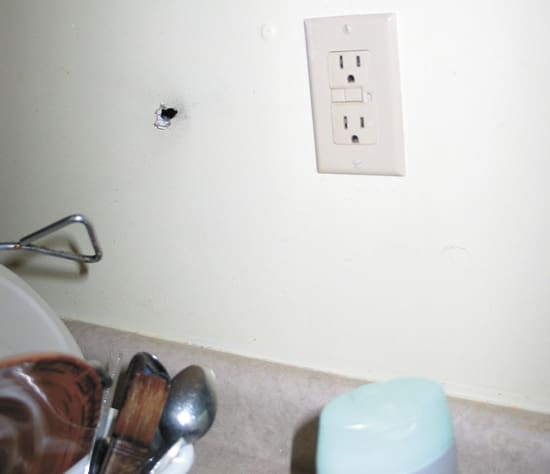I’ve been researching home invasions. As the owner of a nascent security company, I need to know the who, what, when, where and how of the matter. Our comprehensive home defense package includes landscaping, lighting, alarms, video monitoring, security doors, impact resistant windows, safe rooms; and firearms selection, storage and training. But the most important element isn’t hardware. It’s home defense planning and training. And that means thinking outside the box (so to speak). Start with this: what’s the most effective way to prevent home invasions?
To answer that question, I’ve been interviewing victims, crooks, cops and security men. Recently, I rang up TTAG contributor Martin Albright. Martin and I agreed that upper middle to upper class white people living in good neighborhoods with alarms, police protection, firearms and a clear idea how to use them are the group that’s best prepared for a violent home invasion. They’re also the least likely to experience one.
Sure, it happens. No question: you do NOT want to be entertaining those kind of visitors. But despite all the attention these seemingly random crimes receive, despite all the fear they generate and the money spent by well-off folk to prevent/repel them, statistically speaking, violent home invasions are the scourge of lower income, urban, high-crime neighborhoods.
You can round the chances of a “Manson family attack” on Mr. and Mrs. 2.5 kids hanging with their homies in suburbia to zero. For good reason. But first, a caveat . . .
Reliable home invasion stats are non-existent. The FBI and DOJ don’t record them as such. Many states also lack a separate classification for home invasions. If and when police apprehend home invaders, the criminals involved are hauled-up on a smorgasbord of charges: robbery, assault, kidnapping, rape, etc.
Truth be told, anyone seeking to draw conclusions about the general character of home invasions—who, what, when and where—does so based on sketchy information, anecdotes and common sense.
OK, so, my law enforcement buddies swear up, down and sideways that they know the why behind the majority of home invasions: drugs. They assure me that druggies are responsible for the vast majority of home invasions.
Makes sense to me. They’re opportunistic thieves. Their goal is simple: drugs, cash or stuff they can sell for cash to buy drugs. And they don’t travel far from home; they prey on their local community. Lots of druggies, lot of home invaders.
Living in a neighborhood relatively free from illegal drugs kicks the likelihood of a violent home invasion off a statistical cliff. You want to be safe in your own home? Get the hell out of Dodge.
Which is exactly what happened, and continues to happen, in America’s urban core.
When segregation began to disappear from the U.S. housing market, successful, law-abiding members of African American and Hispanic communities left their urban strongholds. This non-white flight removed the moral backbone from their old communities, tipping the social balance towards unemployment, drug abuse and violent crime. The rising tide of violent home invasions in America’s city centers owes its genesis to this exodus.
For those “stuck” in these crime infested communities, the number one home invasion prevention technique is social. If home owners avoid associating with drugs and criminals they have a good chance of flying beneath the drug-addicted home invader’s radar. As long as their home is reasonably but not extravagantly fortified, the enemy will seek out an easier, better known and more obviously lucrative target. Oxymoronically enough, it’s a “hiding out of sight in plain sight” strategy.
This is a key point: most home invasion are not as random as they seem. At the very least, they’re carried out by people who live in the same community as their victims.
This fact gets very little media attention—even when it does. Check out this story at sungazette.com. Shooter’s girlfriend: Without gun ‘we all’ would’ve been killed starts out as the tale of a valiant home defender killing a burglar. Like so many of these home defense stories, it ends up as a narrative in which illegal drugs figure highly.
Mutchler said she and Felver did not know why Miller broke into the house.
“Neil and I have never seen this guy before in our lives, never spoken to him,” Mutchler said.
Since the shooting, Mutchler’s family life has been turned upside down.
Felver, who is also a convicted felon, was arrested and jailed Wednesday on charges of a convicted felon not to possess a firearm, possession with intent to deliver marijuana and possession of marijuana and drug paraphernalia.
Police have refused to disclose the amount of marijuana they said they seized inside Felver’s house on the night of the shooting. Mutchler also declined to comment about the marijuana, but she said her boyfriend is not a drug dealer.
For their own protection, Mutchler has voluntarily placed the couple’s two sons, ages 2 and 5, in foster care, at least until she can find a new home for the family.
“We’re all displaced. My family has to find another place to live. We’re never living in that house again,” Mutchler said. She and her daughter are staying with relatives for now.
Mutchler said she is also having a tough time sleeping at night and is on medication for anxiety.
Bottom line: if you hang with drug takers/dealers, bad shit is going to happen. I feel more sympathy for the law-abiding parents of children in urban areas who get “caught up” in local gangs, whose affiliation eventually results in a violent home invasion. That said, I suspect that the term “law abiding” doesn’t apply to most gang members’ parents. The fruit doesn’t fall too far from the tree.
If social engineering is off the menu, I’m betting that hardening law-abiding lower income residents’ doors would be a far cheaper and more effective way to reduce the possibility of a home invasion than handing beleaguered home owners a handgun. In that sense, Chicago gun control watchers shouldn’t be surprised when home invasions don’t experience the John Lott drop when urban home owners gain access to guns.
Be that as it may, we can draw an important lesson about home invasion prevention from studying its nature at the sharp end. Don’t swim with the sharks.
At the middle to upper end of the social scale, home owners still face opportunistic drug-fueled burglars/home invaders. But the higher up on the socio-economic ladder you climb, the more “professional” burglars/home invaders come into the picture.
It’s important to realize that the main difference between drug-fueled invaders and pros is stylistic. The drug cash seeker is, as previously stated, fundamentally disorganized. The professional burglar is not. The drug cash seeker is more likely to suddenly turn violent and less likely to flee. The pro avoids confrontation, but is equally vicious when it occurs.
But we’re not looking for differences. It’s the similarities that count. In the main, both home invaders have inside knowledge. The former through nearasdammit direct association, the latter by surveillance or—and this is important—indirect association.
In other words, you may not have a burglar casing your crib or a crack dealer om speed dial or a kid who hangs with the Crips, but that shady auto body guy or dodgy antique dealer poses a very real danger to your home security. They know people who know people who want to know what people have so they can take it from them.
Just last night, a friend in the antiques biz told me about a colleague who specialized in invading homes, tying-up people and beating the shit out of them. True story.
While random attacks get all the press, in truth there’s only a couple of degrees of separation between most home invaders and their victims. So here’s one of the best ways to prevent a home invasion: limit contact with “the wrong people.” And keep your privacy private (tell MTV to take a walk).
Avoiding trouble is the best advice for playing the odds on home invasions. In terms of limiting their severity, well, that’s a whole ‘nother story.
The really dangerous home invaders are the one who know you and want to hurt you. It’s got nothing to do with money. It’s PERSONAL. They’re just as clever as you are, twice as evil, patient and incredibly well-prepared. They might even hire someone a team to do the dirty.
Defending against this type of home invasion requires a similar mindset as the one needed to stave off a drug-cash-seeking or professional home invader: tactical awareness leading to social distancing. At least initially.
First, you need to know there’s a serious threat. Second, you need regular intel on your deadly enemy’s movements and/or state of mind. Third, and this is where your strategy departs from preventing drug and cash-motivated home invaders, you need to take pro-active pre-emptive steps to de-fuse your enemy’s ire.
How you do that depends entirely on the situation. But what happens next (or at the same time) is simple enough: by-the-book crime prevention using the same strategies as you would against any other home invader, only more so. We’re talking major league target hardening. In this case, firearms are a must, preferably attached to your person at all times.
Again, statistically, these non-opportunistic home invaders are a non-issue. Unless it’s you and your family in the crosshairs. And then it’s a BIG problem.
As much as I’d like to say a piece of hardware or software or a firearm is the key to safety from home invasions, awareness is the key to any successful home defense strategy. What you dont know CAN hurt you.
As long as we’re modifying maxims, it;s also true that just because you’re not paranoid doesn’t mean someone’s not out to get you. If you know what I mean. If not, it’s time to cut some people out of your life and buy a better front door. Sad, but true.





Very well written. 'Owes its genesis to the exodus' is a line of biblical proportions.
One item that came up in another post was the discussion of not letting your enemy know what you are packing. It would be uncool to disclose your entire aresenal, but perhaps it isn't a bad idea to let the wrong people know about the heat that may or may not be on your person. Let them think you are a little bent so they will move on. Thoughts?
Brett: interesting that you say "on your person." I was addressing home defense rather than personal defense. Of course, there is an obvious intersection. I believe a home defender should carry their gun on their person in the house. But that's just me. And my wife.
See what I did there? I didn't disclose my entire arsenal, but I told the world that there's heat inside my home. Or is there? Maybe this is a head fake. A double head fake. Triple?
Anyway, I can understand the DFWM (Don't F With Me) strategy. People who put "Protected by Smith & Wesson" on their house are not entirely wrong to do so. But they are wrong, and not just because it gives determined home invaders a heads-up. The main problem is that it's a proclamation that you have something worth protecting. Which also means it's worth stealing.
Also note: if you DO shoot someone, posted (or verbal) warnings look very bad. A [non-Texas] prosecutor could paint you as a gun nut (you have MORE THAN ONE?) just waiting for someone to enter your house so you can blow them away.
Ideally, you should be off the radar. A discreet home alarm sticker in all your main windows and a nice lawn sign splits the difference nicely. How you heat your home is a fact that's best left to the criminal's imagination.
Vicious, not viscous. Unless you're talking about turning someone into a grease spot?
D’oh! Text amended. Funny guy.
Comments are closed.